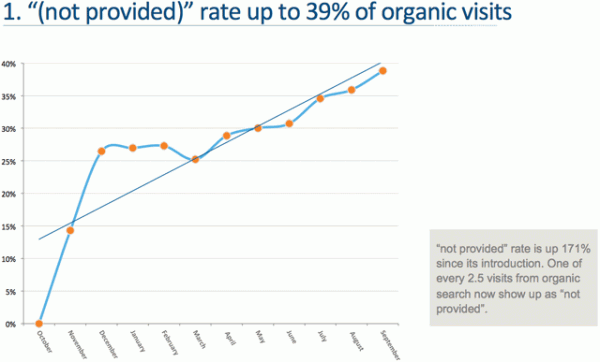Google Chrome Goes Dark
The new version of Google Chrome 25 (still in beta, at the time of writing) will use SSL to encrypt Google searches through the Omnibox (used to type URLs and search), even for users not logged in. Previous searches were only encrypted for logged in users. By doing this the keyword is no longer passed into analytics software like Google Analytics, you will instead see “(not provided)”.
More (not provided), Fewer Keywords
For search marketers and webmasters this means losing more keyword data. It follows from Firefox’s decision to use secure search in July 2012 and Safari iOS6 in September 2012.
Since the launch of the secure search in October 2011, (not provided) has been steadily increasing. With the average generally between 20-30%, others finding it is higher at 39%. No matter the figures it is growing consistently month on month and will not be going away.

Image source: http://searchengineland.com/google-search-referrers-not-provided-139416
What can you do about it? There are ways to estimate or “reclaim” some ground. It is only the referrer not passing the keyword data through, so it is still aggregated in Google Webmaster Tools and Adwords. Another option is to look at other search engines, Bing and Yahoo still send full referring information through. Something very useful is to look at (not provided) and the landing page. A more advanced option is to setup filters in Google Analytics to “extract” keyword position from the referring string and append it to “(not provided)” or landing page. Although this will not give you 100% of results, it is useful.
Implications of Dark Data
- The new version of Google Chrome (25) will encrypt all search data requested via the Omnibox.
- No keyword data will be passed to your analytics software from Chrome’s Omnibox.
- It will be increasingly difficult to track search traffic by referring keyword.
- It is likely that (not provided) will continue to increase.
- Using other available data, such as Webmaster Tools, Adwords, Landing Pages and Google Analytics filters can “reclaim” or estimate some of the lost keyword data.
26,000+ professionals, marketers and SEOs read the Bruce Clay Blog
Subscribe now for free to get:
- Expert SEO insights from the "Father of SEO."
- Proven SEO strategies to optimize website performance.
- SEO advice to earn more website traffic, higher search ranking and increased revenue.

3 Replies to “Google Chrome Goes Dark”
Many of our clients are experiencing the same increase – as high as 80-90% keyword not provided. To-date, I have heard no valid/acceptable reason as to why Google chooses to block the keywords (security/privacy are null IMHO).
Google says they want the best experience for the user, but there is absolutely NOTHING in these changes that backs up that mantra. Hide keywords from the website owners – website owners have no idea what’s working/not – website doesn’t improve – bad user experience.
How is that a win-win?
This is all about AdWords and Google’s desire for more $$. We all just need to start thinking of them as a giant affiliate partner & bake in their cut on all products/services we sell.
The number of (not provided) keywords continues to go up for clients across all industries. It’s extremely frustrating. I don’t think it necessarily means that Google is trying to “kill” keyword optimization, but it is certainly making our jobs tougher.
One of my blogs has almost 90% of dark data already. In order to analyse data I use Bing, Adwords and landing pages as well. Maybe google wants to “kill” the SEO keywords optimization !-\
LEAVE A REPLY









